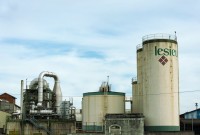- Home
- Business Processes
- Industry Knowledge
- Aerospace Industry
- Automotive Industry
- Banking Domain
- BFSI Industry
- Consumer/ FMCG Industry
- Chemicals Industry
- Engineering & Construction
- Energy Industry
- Education Domain
- Finance Domain
- Hospitality Domain
- Healthcare Industry
- Insurance Domain
- Retail Industry
- Travel and Tourism Domain
- Telecom Industry
- Leadership Skills
- eLearning
- Home
- Domain Knowledge
- Chemicals Industry
- Importance / Impact of Chemicals Industry
Importance / Impact of Chemicals Industry
Chemical Industry is engaged in the development, optimization, and monitoring of fundamental chemical processes used in industry for transforming raw materials and precursors into useful commercial products for society. Learn more about the importance and impact of the chemical industry on agriculture, environment, hygiene, food, painting, etc.
Impact of Chemicals Industry:
Applications of chemical science have contributed significantly to the advancement of human civilization by providing a growing understanding and ability to manipulate chemical molecules. Chemistry controls the tastes and flavors of the food we eat, the scents we wear, the look and feel of our clothes, and how the world appears around us. Chemical behavior and the interaction of elements and molecules give us the energy we need to heat our homes, drive our cars, and to power our lives. This chemical behavior governs the distribution of the natural resources that we need and the industrial processes required to extract them. In turn, we rely on chemistry to turn them into products we rely on every day. Chemical Industry produces 70000 different types of products that are used by individuals as well as other industries. The chemical sector is of strategic importance to the sustainable development of national economies and plays a vital role in the economic development of any country. As per the estimates that there are up to 20 million people employed in the global chemical industries today.
The chemical domain plays a vital role as an applied science in diverse areas that influence human society ranging from economic, environmental, and political stability. The chemical industry has been instrumental in human development and products created by the chemicals industry have had an effect on a number of areas, such as agriculture, hygiene, food, painting, and petro-chemistry, etc.
The chemical industry is considered a societal problem solver; it synthesized crop-enhancing agricultural chemicals to ensure constant and viable food supply, helped in the eradication of deadly diseases by developing life-saving pharmaceuticals and chemical pesticides, developed innovative plastics and synthetic fibers for use in a both industrial and consumer products. Over the years the chemical industry has been a vital sector of the modern industrialized economy.
Some of the high technology industries based on chemical science are agricultural chemicals, ceramics, electronic reagents, glass, paints and solvents, metals and alloys, petrochemical, feedstocks, paper, pharmaceuticals, plastics and rubbers, soaps and detergents, synthetic fibers and the list is endless with more than 60,000 to 70,000 different chemicals being used commercially today.
Importance of the Chemicals Industry in Agriculture:
The agricultural industry makes use of many different chemicals. Fertilizers, insecticides, fungicides, and pesticides are all used to protect crops. Chemical companies contribute to the development of sustainable crops by producing slow-release fertilizers that plants can use more efficiently. Because smaller amounts of these fertilizers are required, less energy is used. In addition, reduced runoff decreases contamination of water systems and subsequent release of nitrous oxide, a potent greenhouse gas. The end result is a markedly improved means of growing crops. Many chemical companies have also developed crops that are drought tolerant or pesticide-resistant, and these properties reduce environmental impact by allowing no-till farming and other “green” practices. These products help sustain higher yields, reduce the loss of crops, and decrease the level of natural toxins produced by bacteria and fungi.
All of these products must undergo an approval process and be deemed safe before they can be used on crops. Many chemical companies are pioneers in the development of seeds, both traditional and genetically modified. They are involved in the production and delivery of fertilizers and soil conditioners. Development and scale-up of processes for effecting chemical transformations and separations of solids, liquids, and gases are the specialties of many companies engaged in producing a commodity and specialty chemicals.
Impact of Chemicals Industry on the Environment:
Environmental science is the study of the interactions between the physical, chemical, and biological elements of the environment. For chemists, this applies to understand the interactions on a molecular scale. This can involve aspects of climate change, conservation, biodiversity, groundwater and soil contamination, use of natural resources, waste management, air pollution, and noise pollution. Chemistry has traditionally been viewed as a scientific tool that could harness natural resources to enhance our lives. However, the production, processing, and use of chemicals in modern society have been accompanied by global-scale environmental pollution, natural resource depletion, and health impacts. However, now the focus is shifting to the development of less toxic chemical products with specific functional properties. Now, the chemical industry has brought its expertise and capital investment into action for solving environmental problems for over fifty years. The industry is continuing to expand its roles in energy efficiency, trace chemical detection and mitigation, applications of natural biochemical materials and processes, and water and air pollution control technology development and application. The industry expects to be a major contributor to expanding the science and technology that supports life cycle environmental assessment and sustainable development policies.
Importance of the Chemicals Industry in Hygiene & Health:
Chemical Sciences help us gain an understanding of the development reasons of the various diseases like cancer, help us improve care and protection by diagnostics and sensors for the prevention and detection of deadly diseases. The chemical sciences will be able to answer many of the challenges of the 21st century including improving health protection and care. Even the detergents are made up of a combination of ingredients, including soap and other surfactants. They are used for washing fabrics, dishes, kitchen utensils, hard surfaces, and laundry.
Chemicals Industry and Sustainable Energy Solutions:
The major cause of global warming is the combustion of fossil fuels and subsequent emission of carbon dioxide and other greenhouse gases and reductions in manmade gas emissions are imperative to halt the rise in global temperatures and the negative impact this will have on our climate. The only way to achieve this is through the conservation of current supplies and the development of new technologies. The chemical sciences will play a key role by helping us manage waste products from energy production and help to reduce the energy demand of domestic living.
Importance of Chemical Sciences on Food:
Food chemistry is the study of chemical processes and interactions of all biological and non-biological components of foods. This discipline also encompasses how products change under certain food processing techniques and ways either to enhance or to prevent them from happening. An example of enhancing a process would be to encourage fermentation of dairy products with microorganisms that convert lactose to lactic acid; an example of preventing a process would be stopping the browning on the surface of freshly cut Red Delicious apples using lemon juice or other acidulated water. Similarly, chemicals, such as salt, spices, and sulfides, have been added to food for centuries, both to improve taste and help with preservation. The processed food industry depends on the identification of new additives that can help preserve the foods. Similarly, food emulsifiers are used in salad dressings, margarine, and ice cream. Another example could be the use of citric acid to enhance the flavor of lemon or lime soft drinks.
Importance of Painting & Coating:
The Paint Manufacturing industry plays an important role within specific sectors of the economy because they provide protective and decorative finishes for many products in various end-use markets. Paints and coatings are used to cover a large number of products, from computers, circuit boards, and microchips to buildings, cars, planes, and ships. The construction sector needs paint for the houses and commercial buildings it constructs, and the manufacturing sector requires paint for certain products, particularly cars and boats. Although their primary purpose is to protect products and make them more attractive, they also serve a number of other functions. For example, they can help save resources by making products last longer. They can also be used to absorb or reflect light, conduct electricity, or as anti-skid surfaces. Products include Car paint, Paint and varnish for the construction industry, Emulsion paint, Stoving paint, Wood coating, Plastics coating, Furniture and paper varnish, Powder coating, Anti-corrosion paint and Cement paint, etc.
Importance of Petro-Chemistry:
Petrochemistry involves transforming crude oil and natural gas into basic petrochemicals, such as ethylene, propylene, butadiene, and benzene. The process of refining crude oil leads to the production of a number of by-products that are classified as petroleum products. These petrochemicals form the basic building blocks for a large variety of products. These products are present in our daily trivial things to the most significant things available. The uses of these products are so significant that it is simply impossible to live life without it. Some of the most common products which contain these by-products include paints, thinners, dry cleaning chemicals, inks, insecticides, charcoal lighters, construction chemicals, and so forth. With an endless list, it is quite impossible to categorize all the items.
These products have a wide variety of uses, the wax is widely used to make candles, various types of polishes, cartons, and so forth, synthetic is of immense importance and used as a raw material for manufacturing different types of garments, fertilizers are used to protect crops from damage, preservatives used in canned food and for producing different types of vitamins, dyes are used in ink pens and cloth dyes, and the majority of the plastic containers, plates, and cups contain this by-product of crude oil. Hence petrochemical products are used in varied forms in all fields, ranging from common household items to complex applications; the uses are extensively wide and different. Through the development of new technologies and materials, petrochemistry enables the creation of products like computer chips, cell phones, automobiles, and pharmaceuticals. Petrochemistry is known as an enabling industry. That is, it supports a wide range of essential industries, including health care, construction, telecommunications, and transportation.
Importance of Pharmaceuticals:
Biological science involves studying the science of life. However, chemistry is important to a variety of sub-disciplines. These can include health science, the discipline of applied science that deals with human and animal health, looking at how the body functions, and using this knowledge to improve health and cure diseases. The study of pharmacology determines how substances (typically pharmaceuticals) interact with living organisms to produce a change in function. Biochemistry is the study of the chemical substances and vital processes occurring in living organisms, studying biomolecules such as proteins, lipids, and carbohydrates. Molecular biology is looking at biology at the molecular level, analyzing the processes that control cells, including replication, transcription, and translation of genetic material within cells. This discipline also includes biotechnology, the use of biological systems to modify or derive new products, typically drugs or foodstuffs.
Chemicals and Construction Industry:
The residential construction market is a major consumer of chemicals. Chemicals comprise approximately 17% of all materials used in new construction. Home construction and buying consume synthetic materials such as pipes and siding, manufactured from plastics. Construction stimulates demand for appliances, carpeting, furniture, and paints – also produced from chemicals. The strength of the construction industry directly impacts the strength of the chemical industry.
Chemicals and the Automobile Industry:
Car manufacturing consumes a significant amount of chemical products in the form of plastics, rubber, fibers, and paint. Every automobile contains over $2,000 worth of chemical processing and products. Most of the major Diversified chemical firms serve the automotive sector in the areas of specialized coatings and plastics.
Related Links
You May Also Like
-
Business Model & Value Chain of Chemicals Industry
Understand the three critical business models applied by the Chemicals Industry to create value for its customers; asset-driven business model, integrated business model, and specialties business model. This article also explains the chemical industry value chain and provides some practical examples for a better understanding.
-
Importance / Impact of Chemicals Industry
Chemical Industry is engaged in the development, optimization, and monitoring of fundamental chemical processes used in industry for transforming raw materials and precursors into useful commercial products for society. Learn more about the importance and impact of the chemical industry on agriculture, environment, hygiene, food, painting, etc.
-
Overview of Chemicals Industry
The chemical industry is critical for the economic development of any country, providing products, and enabling technical solutions in virtually all sectors of the economy. This article provides an overview of the chemical industry, explaining the definition and processes in the chemical domain. Read about the various segments of the chemical industry and what they do. A brief discussion on the major players in the chemical domain and their impact on the global and US economy.
-
Fundamentally, the chemicals industry can be divided into two sectors; commodity/basic chemicals and specialty chemicals. Commodity chemicals are manufactured by many different companies however the end product is generally the same with very little variations. There exist other segmentations for this industry as well. Understand the main sectors of the chemical domain.
-
This article provides a concise history of the chemicals industry. How the chemical industry progressed and changed over time. Explore the journey of the Chemical industry from the early ages to the twenty-first century. Chemicals have been manufactured for thousands of years. The history of the chemicals industry can be traced back to ancient times when alkali and limestone were combined to make glass, and sulfur and saltpeter became an explosive that is similar to modern gunpowder.
-
Chemicals Industry’s Supply Chain
This article explains the chemical industry supply chain and addresses key questions like the importance of supply chain management and why the chemicals industry needs to focus on supply chain management. Understand the key factors influencing the supply chain for the chemicals industry and strategies to overcome the current challenges.
-
Industry trends are examined to make predictions. This article discusses the trends in the chemicals industry including trends related to consumer behavior, employment, technological advancements, new product development, competition, government norms, and other factors that impact the industry.
Explore Our Free Training Articles or
Sign Up to Start With Our eLearning Courses

About Us
Learning
© 2023 TechnoFunc, All Rights Reserved







